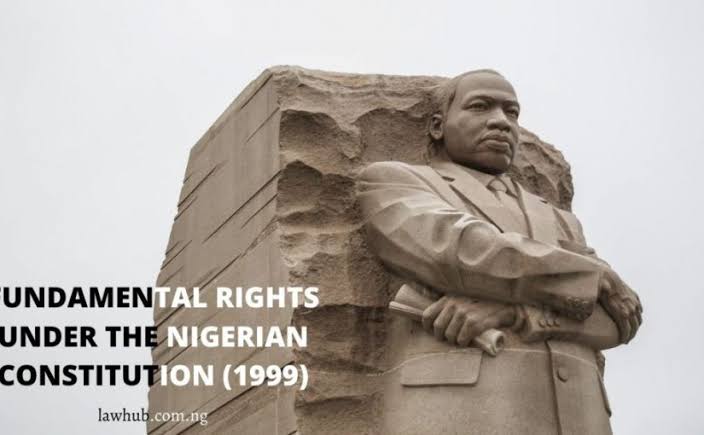Human Rights Under the 1999 Constitution
The fundamental rights of the citizens of the Federal Republic of Nigeria are contained in Chapter (II) and (IV) of the Country’s constitution, 1999.
The chapter II is titled, “Fundamental Objectives and directive Principles of State Policy”. The ‘rights’ contained therein are known as Social-economic rights. However, these rights are not enforceable in Nigeria by provision of section 6 (6)(c) of the constitution.
Going forward, the Fundamental Rights contained in Chapter IV of the constitution are enforceable rights of citizens of the country.
Per Mojeed Adekunle Owoade, JCA, in Akwa Savings and Loans Ltd. v. Udoumana & Ors [(2009) LPELR-8861(CA)] remarked, “I do agree with the learned Counsel for the 1st Respondent that it is now a settled position of our law that the provisions in Chapter IV of the Constitution are enforceable not only against the State and its apparatus but also artificial persons as the Appellant in the instant case. …”
Let us now take a close look at what these rights are. The Fundamental Rights as specified under the 1999 constitution, section 33-44, includes:
- Rights to life (section 33)
- Right to dignity of human persons (section 34)
- Right to personal liberty (section 35)
- Right to fair hearing (section 36)
- Right to private and family life (section 37)
- Right to freedom of thought, conscience and religion (section 38)
- Right to freedom of expression and the press (section 39)
- Right to peaceful assembly and association (section 40)
- Right to freedom of movement (section 41)
- Right to freedom from discrimination (section 42)
- Right to acquire and own immovable property (section 43)
- Right against compulsory acquisition of property (section 44)
In an event of the violation of these rights, Section 46(1) of the same chapter of the constitution empowers the victim to seek redress in a High Court. It states – “Any person who alleges that any of the provisions of this Chapter has been, is being or likely to be contravened in any State in relation to him may apply to a High Court in that State for redress.”
However, these rights listed above have necessary exceptions. For example, the Right to life would not be acknowledged to have been violated if a citizen’s life was taken for the defense of any person from unlawful violence or for the defense of property, to effect a lawful arrest, to prevent the escape of a person lawfully detained, and for the purpose of suppressing a riot, insurrection or mutiny.
Per Ayobode Olujimi Lokulo-Sodipe, JCA, in Okeihe v. State [(2019) LPELR-48961(CA)], opined, “The amended 1999 Constitution of the Federal Republic of Nigeria in Section 33 guarantees the right to life of every person and commands that no person shall be deprived intentionally of his life, save in the execution of the sentence of a Court in respect of a criminal offence of which he has been found guilty in Nigeria.”
In like manner, Section 34(c) that provides that no person shall be required to perform forced or compulsory labour has exceptions in 34 (2). One of the exceptions is that such labour is allowed in consequence of the sentence or order of a court.
In Azuh v. Union Bank [(2014) LPELR-22913(SC)], Kudirat Motonmori Olatokunbo Kekere-Ekun, JSC, said, “Where criminal charges are pending against an accused person, his right to freedom of movement pending the determination of the case may be curtailed by the Court seised of the matter or by a higher Court, depending on the nature of the offence.”
In conclusion, the fundamental rights of every Nigerian is contained in Chapter (IV) of the 1999 constitution, coupled with necessary exceptions. In event of the contravention of any of these rights, redress can be sought in a High Court of the victim’s state.


Leave a Reply